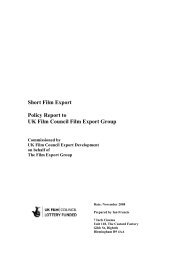Northern Alliance - BFI
Northern Alliance - BFI
Northern Alliance - BFI
Create successful ePaper yourself
Turn your PDF publications into a flip-book with our unique Google optimized e-Paper software.
There was a very high level of consensus that talent development through short<br />
filmmaking requires subtlety and sophistication in approach. At its most advanced,<br />
short filmmaking is seen as allowing filmmakers to perfect their art through<br />
performance, while for relative novices more formal support is required and the<br />
opportunity to train and be trained is as important - or even more important - than<br />
the final product.<br />
As noted in section 3, Skillset supports dedicated training schemes which run<br />
alongside the Digital Shorts and Cinema Extreme programmes: in both instances,<br />
Skillset categorises this support as „training linked to production‟. Although this is<br />
clearly not an illogical categorisation, it is notable that Skillset does not consider its<br />
support for either Cinema Extreme or (in particular) Digital Shorts as part of its<br />
commitment to new entrants – which includes training strands for writers, directors<br />
and producers (as well as craft and technical grades). It appears that there is an<br />
opportunity for greater efficiency and effectiveness through a more co-ordinated<br />
approach.<br />
“It is difficult to assess properly without adequate information, but I feel we should<br />
be identifying talent at First Light and supporting it through to feature filmmaking.”<br />
Paul Green, talent scout, Skillset<br />
Probably the most important objective and rationale for higher education institutions<br />
is the development of skills, technical competence and other broadly educative goals,<br />
rather than the development of feature filmmaking talent. However, it is hard not<br />
get the impression that an opportunity is being missed, especially given the amount<br />
of money the funding councils devote to the production of short films, and the<br />
resources and expertise that Skillset engages to develop new entrants training,<br />
unrelated to the NCF‟s short film activity.<br />
“We need a more joined-up strategy, where there is a smooth transition from<br />
training to production. At the moment, they don‟t marry up.”<br />
Neil Peplow, Head of Film, Skillset<br />
Evaluation of individual training programmes specifically related to the UK Film<br />
Council‟s short film schemes was generally positive, 60 but this was contradicted by<br />
the frustration expressed by some attendees of the focus groups, especially the more<br />
experienced filmmakers who felt the support made available to them was not geared<br />
up to their stage of development.<br />
There is an opportunity for increased coordination of the work of Skillset and the<br />
NCF, and for better leverage of the considerable sums invested in short filmmaking<br />
via higher education.<br />
60 See Appendix XVII.<br />
Page 42
















